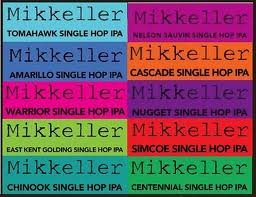 I am just finishing off a bottle of Mikkeller Single Hop East Kent Golding IPA. In and of itself it is a decent but unremarkable beer. It has the house yeast pungency of all Mikkeller beer and a balanced, presentable hop punch. It is well made, and worth the taste in and of itself. But what makes it noteworthy is the broader project of which it is a part.
I am just finishing off a bottle of Mikkeller Single Hop East Kent Golding IPA. In and of itself it is a decent but unremarkable beer. It has the house yeast pungency of all Mikkeller beer and a balanced, presentable hop punch. It is well made, and worth the taste in and of itself. But what makes it noteworthy is the broader project of which it is a part.
Mikkel Borg Bjergsø, the brains behind this crazy, gypsy Danish brewery, decided to build a series of India Pale Ales that used a single hop variety in each. The base recipe does not change. He is doing it to educate the beer consumer on what each type of hop brings to a beer. By using only one hop in a relatively bitter beer, he allows the unique character of each hop to present itself, thus clarifying for all of us the difference between hops and the special character of each.
By my count there have been 10 of the Single Hop series – although it is hard to be certain about anything in the world of Mikkeller. The EKG is the only one to have made it to Alberta (the Agent tried but couldn’t swing more), although I got my hands on a bottle of the Cascade a few months ago. Therefore I am hardly in a position to offer a definitive discussion on the results of Mikkel’s grand experiment. However as I sip this one, I am already noticing the stark difference from the first. The East Kent Golding is earthier and plays harder to get around the aroma. EKG defines British hops for me, and throwing it in his neutral base really shows how earthy, soft and rounded it is as a hop. It is quite subtle in comparison to the Cascade, which presented that classic American citrus nose and flavour. The first bottle seemed sharper overall.
I am sad we have only experienced two of the series, as this may be one of the most interesting experiments I have witnessed in a long time. It does what Mikkel wants it to do – highlight the subtle and not so subtle differences between hops. It is the kind of thing a homebrewer with lots of carboys might try.
We all know, in theory, how hops affects beer. The bittering, the aroma and the flavour, depending on when it is added. More advanced beeries also know the difference between American hops, with their grapefruit and pine, from the earthy, floral quality of noble hops. But how well do we really know our hops? Much of what we know is from books or other beer guys. The broad categorizations – American vs. Noble – only take us so far.
I have been brewing for over 20 years, and feel like I have a good handle on the various hops. But a series like this makes me sit up and take notice. It makes me question my assumptions and allows me in one of the most unadulterated ways I know to taste test different hops. I would do many immoral things to get my hands on the rest of the series, and I can’t think of a more cool event than a side-by-side tasting of the whole series. Alas, that won’t happen, at least not for a while.
I kind of wish other brewers would attempt this. It takes bravery and time, but thankfully Mikkeller has that in spades.

January 25, 2011 at 9:49 PM
FYI Charlevoix from Quebec has also done that with a line of La Vache Folle Imperial IPA’s. At least 4 have been available in Edmonton within the past year, that I know of: Simcoe, Herkules, Columbus, and Amarillo. According to Beer Advocate, they also have a Centennial and a Bravo version as well.
And of course, as homebrewers, we can also take on our own experiments at any time. I’ve done a single hop imperial IPA with Cascade, Amarillo, and Centennial, which was a neat experiment to really explore the flavor that each hop brings.
January 25, 2011 at 9:53 PM
Yes, I must do a Mea Culpa on that one. I had forgotten about the Vache Folle series. I have had a couple of them. I promise to pick up as many as I can and write about it. I hope that is a sufficiently appropriate penance.
Jason
January 26, 2011 at 11:58 AM
The Vache Folle Centennial will be at better stores this week, also a bit pricey is their Champagne Conditioned beer.
January 26, 2011 at 4:23 PM
I’ve had 7 of them at this point (travel and trades) and it is a great thing to do. Discovering what flavours are to be had in the single hops have helped me out in determining what I’m tasting in other beers (especially helpful are the bottles that state ingredients, like Rogue). The Mikkeller 10 is the combination of all 10 single hop varieties in one bottle.
Trying these fresh is the key – any ideas on when they were brewed? I assume they are all one offs.
January 26, 2011 at 4:42 PM
@Hoser: Sure enough, there it was when I walked in to Sherbrooke today.